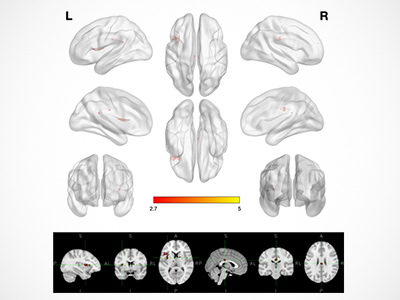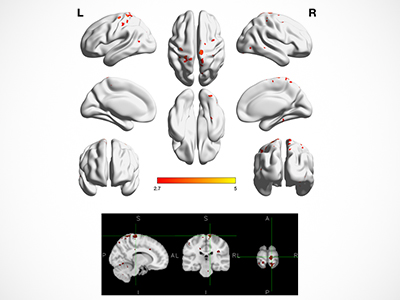
Increased connectivity in parts of the brains of older adults with possible mild cognitive impairment could be an underlying mechanism of poor sleep.
A good night’s rest not only leaves us feeling more alert and balanced the next day, it also plays an important role in our overall health and well-being. Research published in the Journal of Alzheimer’s Disease in September 2022 and led by Vancouver Coastal Health Research Institute investigator Dr. Chun Liang Hsu reveals previously unidentified connections between processes in the brains of older adults with possible mild cognitive impairment (MCI) that might be hindering restful sleep.
“This discovery paves the way for future treatment interventions that could improve sleep quality and longevity,” says Hsu. “Research shows that well-rested older adults tend to exercise more, fall less and potentially have delayed worsening cognitive impairment.”
“Before we can establish a successful treatment, we need to better understand the underlying mechanisms of the disease.”
MCI is characterized by cognitive decline beyond that of normal ageing, but not so severe that it inhibits daily activities, such as thought processes, judgement and wayfinding.
It is estimated that around 747,000 Canadians are living with cognitive impairment or dementia. Among older adults diagnosed with MCI, approximately 30 per cent will develop dementia within five years.

Around 47.6 per cent of older adults aged 65 and older reported experiencing fair or poor quality sleep, according to a 2020 Statistics Canada report.
Early care interventions may help prevent the progression from MCI to dementia, says Hsu. However, researchers still need a better understanding of the physiological factors at play.
Connectivity between parts of the brain contributed to fragmented sleep
For his research, Hsu analyzed the quality of sleep of 36 community-dwelling older adults aged 65 to 85 years with possible MCI over a period of 14 days.
Researchers tracked study participants’ sleep quality and duration using MotionWatch 8 actigraphy wearable technology — watch-shaped devices that can be used to estimate sleep quality via detecting the amount of ambient light and motion during sleep windows.

While at rest, participants also received functional magnetic resonance imaging (fMRI) — a type of brain scan that is able to take images of signals originating from blood flow to infer brain function using non-radiating magnetic fields. Researchers used these scans to analyze participants’ brain activity and function.
Particular attention was paid to participants’ somatosensory network — a region of the brain responsible for coordinating motor functions, such as finger tapping. Researchers also examined fMRI scans of the frontoparietal network, which supports the quick initiation of tasks, complex problem-solving and sustained attention. They likewise tracked participants’ default mode network — a part of the brain that is active when a person is not engaged in cognitive tasks or focused on the outside world.

Hsu and his team found that participants who had a more restless sleep showed increased connectivity between their somatosensory network and the frontoparietal network, or parts of the brain related to attention and sensory processing.
“Increased connectivity in the somatosensory and frontoparietal networks often happens when someone is performing a task or under a heavy cognitive load,” Hsu explains. “Given that the somatosensory network and the frontoparietal network are both task-related networks, we believe that the inability of the brains of older adults with MCI to disengage these networks may be interfering with typical brain functionality.”
“This may prevent large-scale networks in the brain from winding down and disengaging from each other as a person progresses towards deeper states of sleep, thereby resulting in poor-quality sleep.”
With further research, Hsu believes scientists may be able to develop a therapy that targets and possibly modulates or inhibits the sleep-disruptive connectivity in these areas of the brain.


